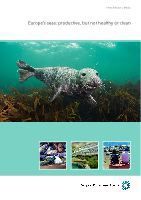Europe's seas: productive, but not healthy or clean
State of Europe's seas
A new report published by the European Environment Agency (EEA) shows that, despite some improvements, the way we use our seas remains unsustainable and threatens not only the productivity of our seas, but also our wellbeing. Human activities and climate change are increasingly putting a number of pressures on Europe’s seas, the cumulative effects of which threaten the functioning and resilience of marine ecosystems.

From fisheries to offshore energy production, and protection of marine biodiversity, the EU has a range of policies related to planning and regulating the sustainable use of Europe’s seas. The Marine Strategy Framework Directive, adopted in 2008, aims to ensure coherence between such EU policies and sets three goals for Europe’s seas: to be ‘productive’, ‘healthy’, and ‘clean’. Based on the data available, the EEA finds that although Europe’s seas can be considered productive, they cannot be considered healthy or clean.
The report also looks into describing what ecosystem-based management could mean in the marine context and how to improve our knowledge, as well as considering future challenges in relation to the long-term sustainability of Europe’s seas. A selection of facts can be found below.
Summarizing facts from the report:
- For species and habitats assessed from 2007 to 2012 under the EU’s Habitats Directive, 9% of marine habitats and 7% of marine species assessments were in ‘favourable conservation status’, while 66% of habitat and 27% of species assessments were ‘unfavourable’.
- Over 650 marine fish species, over 180 marine bird species, five species of sea turtles and almost 40% of the world’s known marine mammals are found in Europe’s seas.
- Climate change is already affecting Europe’s marine ecosystems.
- Hazardous substances are widespread in the marine environment. They can accumulate through the marine food chain and pose health risks to humans.
- Marine litter, mainly in the form of plastic, is also accumulating in Europe’s seas. Most of the litter comes from land-based activities. Micro-plastics can enter the food web.
- Underwater noise from human activities (shipping, renewable energy, oil and gas extraction, etc.) is increasing and can have a wide range of impacts on marine life.
- Signs of improvement are observed in certain pressures, such as fishing and nutrient loading.
- More than half of the commercial fish stocks assessed are not in good environmental status.
- Total catches in all fishing regions have been declining in the past ten years. The EU is increasingly dependent on imports of its most widely consumed species: tuna, cod and salmon.
- The maritime sector is estimated to provide 6.1 million jobs and to generate an economic value of approximately EUR 467 billion.
Source: EEA (2015): Europe's seas: productive, but not healty or clean. Copenhagen: European Environment Agency www.eea.europa.eu [1]
